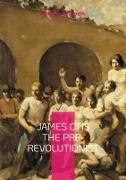Read more
John Clark Ridpaths James Otis the Pre-Revolutionist illuminates the pivotal role of James Otis Jr., the incendiary orator and legal visionary whose defiance against British oppression ignited the spark of American independence. This meticulously researched biography traces Otiss journey from his Harvard education to his landmark 1761 courtroom battle against the Writs of Assistance, a confrontation that crystallized colonial resistance to arbitrary searches and taxation without representation.
The narrative captures Otiss transformation into a revolutionary ideologue, whose fiery speeches and writings including The Rights of the Colonies Vindicated articulated foundational principles of self-governance and natural rights. Ridpath reveals how Otiss legal acumen and moral clarity influenced Samuel Adams, John Adams, and other architects of the Revolution, while also exploring his tragic mental decline, which sidelined him from the later stages of the independence movement.
Key themes include the evolution of colonial political thought, the interplay between intellectual dissent and grassroots activism, and the personal sacrifices of early patriots. The work contextualizes Otiss contributions within broader 18th-century struggles, such as the Stamp Act crisis and the formation of intercolonial solidarity.
About the author
John Clark Ridpath (1840.1900), a towering figure in 19th-century American historiography, distinguished himself through exhaustive scholarship and accessible prose. Born in Indiana to a family with Virginia roots, Ridpath rose from humble beginnings to become a leading educator, earning recognition for his encyclopedic works such as A Cyclopaedia of Universal History and Great Races of Mankind.
Ridpaths commitment to democratizing knowledge shaped his approach to biography, blending rigorous archival research with vivid storytelling. His portrait of James Otis reflects this dual emphasis, positioning Otis as both a legal luminary and a flawed human being. A staunch advocate for civic education, Ridpaths writings underscored the moral imperatives of liberty and self-determination, themes that resonated during the post-Civil War era.
Though lesser-known today, Ridpaths legacy endures in his ability to synthesize complex historical currents into compelling narratives. James Otis the Pre-Revolutionist exemplifies his talent for resurrecting marginalized voices and clarifying their impact on national identity.

